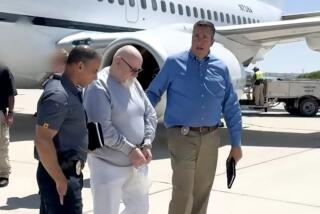Newport Beach police say DNA helps identify killer from 1980 cold case

On the afternoon of Nov. 26, 1980 — the day before Thanksgiving — Irvine resident Judy Nesbitt left for Marina Dunes Yacht Anchorage to show the family’s listed 35-foot cabin cruiser to a potential buyer.
The appointment had been set for 1 p.m., but hours later, Nesbitt still hadn’t returned home. Her husband, Fred, traveled to the marina, found the slip where the boat, Felicidad IV, was tied up and descended into the cabin.
There, he found the body of his wife. The mother of four had been shot once in the head and left for dead, the Los Angeles Times reported in 1980.
Some credit cards, a checkbook and cash pointed to robbery as a possible motive in her violent killing. But even after working through the Thanksgiving holiday, Newport Beach police could not obtain a clear lead on a suspect. The case would grow cold over the next four decades.
That changed Monday when Newport Beach police officials announced that with the help of DNA extraction and some genetic genealogy, authorities had finally identified the killer: Kenneth Elwin Marks, who died in 1999.
“This is a case that has hung heavy in the hearts of our community, our department and the Nesbitt family,” Newport Beach Police Chief Jon T. Lewis said in a statement. “Kenneth Marks has passed away, but he no longer gets to hold the secret of his deeds. Through incredible advances in technology and the tireless dedication of these investigators, we now have some closure for all who knew and loved Judy Nesbitt.”
In Monday’s release, police described how hairs from an unknown suspect were kept in evidence until 2002, when a limited DNA profile was extracted from their roots and entered into the FBI’s Combined DNA Index System, a database that catalogs genetic information for use by law enforcement agencies.
For the next 16 years, the DNA profile sat in the system, unmatched with any other sample, while Newport Beach police continued to puzzle over the owner of the hairs, the release said. Then, in 2018, a technological advance provided investigators the break they needed to identify a suspect.
Green Laboratories was able to extract an expanded DNA profile from the remaining hair shafts that, with the help of genetic genealogist CeCe Moore, were used to identify Marks as Nesbitt’s killer, police said.
Authorities said the case is the first in the nation in which DNA extraction was used to identify a killer in a criminal investigation. Police were not immediately available to provide further information on the case.
An obituary printed in Texas’ Fort Worth Star-Telegram showed that Marks, 44, died of cancer at his home in California on April 30, 1999. The notice was published with a Santa Ana dateline and said Marks was to be buried at Thomas Cemetery in Bridgeport, Texas.
Cardine writes for Times Community News.
More to Read
Sign up for Essential California
The most important California stories and recommendations in your inbox every morning.
You may occasionally receive promotional content from the Los Angeles Times.











